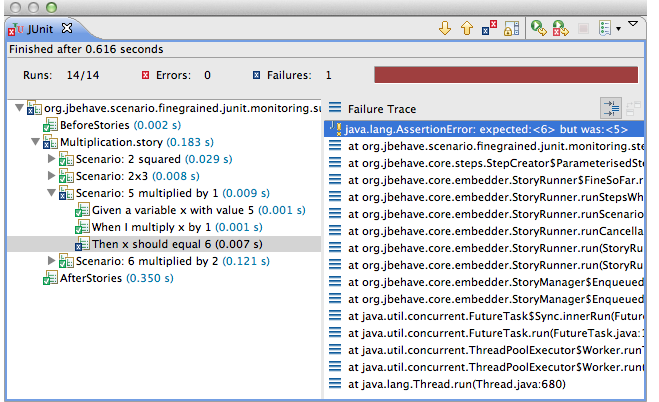JBehave JUnit Integration









This little project is designed to make JBehave
stories & scenarios show up in the JUnit view
in Eclipse and potentially other IDEs that support
custom test runners.
Installation
The project consists of only a handful of classes
and is easy to use.
Using Maven
The easiest way is to include
it in your acceptance test project(s) by ways of
a Maven dependency. Binary, Sources and Javadocs are
all available from Maven Central.
<dependency>
<groupId>com.github.valfirst</groupId>
<artifactId>jbehave-junit-runner</artifactId>
<version>2.3.1</version>
</dependency>
Note that the JBehave library is set to scope provided
in the POM, because any project using this Runner will
naturally have their own version of JBehave already.
Current development SNAPSHOT versions are available from
Sonatype's Nexus for Open Source projects.
Without Maven
If you cannot or do not want to use Maven, just
add the library to your classpath.
Also make sure you add the dependencies of this library to the classpath as well. They can be
seen in the pom.xml. For convenience, they are listed here, too:
- jbehave-core (4.1+)
- junit (4.12)
Your project will of course have JBehave already, just make sure it is version 4.1 or above.
Usage
Once it is on your classpath, the runner can be used
to visualize the structure and the successes/failures
of your JBehave acceptance tests.
Enabling
You will probably already have one or more classes
that extend the default JBehave JUnitStories class.
Just add this annotation:
@RunWith(JUnitReportingRunner.class)
public class MyAcceptanceTests extends JUnitStories {
...
}
Usually, this is everything you have to do. If you want to,
you can use a little helper method to configure the configured
Embedder so that it works nicely together with the JUnitReportingRunner.
JUnitReportingRunner.recommendedControls(configuredEmbedder());
This tells JBehave to use only one thread, and don't throw any exceptions
when generating views or otherwise wrapping the execution up. This would
confuse JUnit considerably, rendering the AfterStories Suite incomplete.
Caveats
There are a few issues you might encounter upon first installation and
integration into your project. To alleviate these, the following are a
few common pitfalls.
java.lang.NoSuchMethodException: ...storyPaths()
If you run into problems like this
java.lang.NoSuchMethodException: MyAcceptanceTests.storyPaths()
at java.lang.Class.getDeclaredMethod(Class.java:1937)
at org.jbehave.scenario.finegrained.junit.monitoring.JUnitReportingRunner.<init>(JUnitReportingRunner.java:33)
at sun.reflect.NativeConstructorAccessorImpl.newInstance0(Native Method)
at sun.reflect.NativeConstructorAccessorImpl.newInstance(NativeConstructorAccessorImpl.java:39)
at sun.reflect.DelegatingConstructorAccessorImpl.newInstance(DelegatingConstructorAccessorImpl.java:27)
at java.lang.reflect.Constructor.newInstance(Constructor.java:513)
at org.junit.internal.builders.AnnotatedBuilder.buildRunner(AnnotatedBuilder.java:31)
....
you are likely extending a custom base class which
was probably introduced to provide some common methods
for all your test classes. This is perfectly fine,
however in case you pulled up the storyPaths() method
into that common base class, you
- either need to make it public OR
- override it in all descendants of that base class
(just calling the super implementation is fine).
This is due to a reflection issue and might be fixed in
future versions.
java.lang.NoSuchMethodError: org.junit.runner.Description.createSuiteDescription
If you see JUnit throw an error soon after a test starts, that looks like this
java.lang.NoSuchMethodError: org.junit.runner.Description.createSuiteDescription(Ljava/lang/String;[Ljava/lang/annotation/Annotation;)Lorg/junit/runner/Description;
at de.codecentric.jbehave.junit.monitoring.JUnitDescriptionGenerator.createDescriptionFrom(JUnitDescriptionGenerator.java:43)
at de.codecentric.jbehave.junit.monitoring.JUnitReportingRunner.buildDescriptionFromStories(JUnitReportingRunner.java:152)
at de.codecentric.jbehave.junit.monitoring.JUnitReportingRunner.<init>(JUnitReportingRunner.java:73)
at sun.reflect.NativeConstructorAccessorImpl.newInstance0(Native Method)
...
you most probably have an old version of JUnit on your classpath that does not have
that method signature yet. Verify that you are using a recent version of
JUnit and that it is not hidden by an older version which might hide it by being
declared first on the classpath.
Example output
Once you are all set, you use the regular Run As -> JUnit Test
command in Eclipse. The JUnit view should appear and display something
like this:

Reporting Issues
In case you run into problems or have ideas on how to improve this
piece of software, please do not hesitate to open an issue in the
issue tracker, here on GitHub.
To make things easier (and quicker) for yourself (and us), please
provide the following pieces of information in your ticket:
- The version you are using (e. g. "1.0.0" or "1.0.1-SNAPSHOT as of 2012-05-25")
- If possible, a stack trace of the error.
- Ideally, a limited test case that allows us to reproduce the
problem locally. This is indeed the best way to get a bug fixed
quickly, because we'll have something specific to work on.
- Any information about your environment that might be helpful, e. g.
your JBehave version, which operating system, etc.
It might also be a good idea to try, if your particular problem has
been fixed already in the latest snapshot release.
And, of course, we'd also very much appreciate pull requests for fixes
that you have already made yourself. After all, this is where open source
shines most :)
Credits
This project is based on the original implementation by Mark Burnett, located at http://code.google.com/p/jbehave-junit-monitor/ which worked with earlier versions of JBehave.
License







